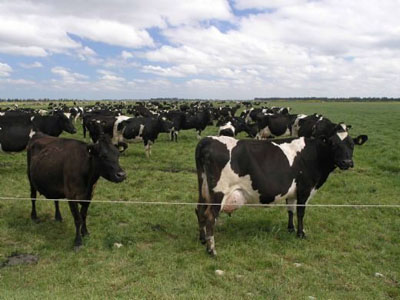High milk prices are generating heat in the rural real estate market as buyers advance on dairying and dairy-support land. Cash-flush farmers with more income from a payout expected to reach $7/kg of milk solids are investing or forming syndicates to increase their holdings. They will have taken the lion’s share of the 44 grazing farms and 16 finishing blocks that were among 144 farms sold in Canterbury in the three months to February. Fifteen dairy farms were also sold. Canterbury farm prices have risen to $1.6 million from a median of $1.3m over the same period a year ago, although this has softened from $1.95m in the three months to January.
Real Estate Institute of New Zealand rural spokesman Peter McDonald said dairy farm sales were healthy and there was confidence in the rural real estate market.
“On a national average, we have reached $44/kg which is something of a record and it is on the back of positive comments from Fonterra and payout increases.”
He said dairy farmers who had traditionally been in an asset-rich and cash-poor position were being provided with the cashflows to increase the size of their current blocks.
“Particularly in Canterbury, there is a lot of syndicate buying. There is a lot of confidence in the dairy industry.”
PGG Wrightson Real Estate South Island manager Peter Crean said the company had sold four Amuri sheep and beef properties in the last month, worth a total of more than $28m, to local dairy interests.
“Many dairy farmers are motivated to make the best of the positive outlook they have at present as a consequence of Fonterra’s forecast payout, and seek to buy additional land to further boost their production.”
The Amuri properties will be converted for dairying or for dairy support. Crean said the farms all had good water consents. “The difference between the irrigated and non- irrigated market is starting to open up a bit.
“Farmers who are spending money and converting want good reliable water.”
The Amuri farms made between $30,000 and $35,000 a hectare, up 30 per cent to 40% on values for similar properties in the district last year.
Crean said irrigated properties with conversion potential were making more than $35,000/ha if they had milk production potential, a desirable location and reliable water. Higher grain prices had strengthened demand for arable properties, but the sheep and beef farm market was more difficult.
Nationally, the dairy land boom has continued although values are slightly back from the record of $4.25m in the three months to January. A 484-hectare dairy farm at Patoka in isolated Hawkes Bay sold for $14.5m at $29,959/ha or $39kg/ms. The farm was producing 370,000kg/ms at 764kg/ms a hectare. Another major sale was a 285-hectare property at Waianiwa, producing 289,707kg/ms for $12.9 million. Its generating capacity of 1015kg/ms a hectare realised a price of $45,015 a hectare or $45kg/ms solids.
McDonald said drought in rural areas such as Taranaki and Waikato was a problem, but there was no sign that this was leading farmers to sell properties. The movement of grazing blocks was a result of high dairy prices, he said.
Farm values are expected to continue to rise on the back of worldwide demand for milk. The conversion of United States land for biofuel production is likely to result in continued high prices because New Zealand’s grass-based system does not have the grain pressure of other countries. Other Canterbury sales were 16 finishing properties, 12 arable, 12 special, three forestry and two horticulture as well as 263 lifestyle blocks.
